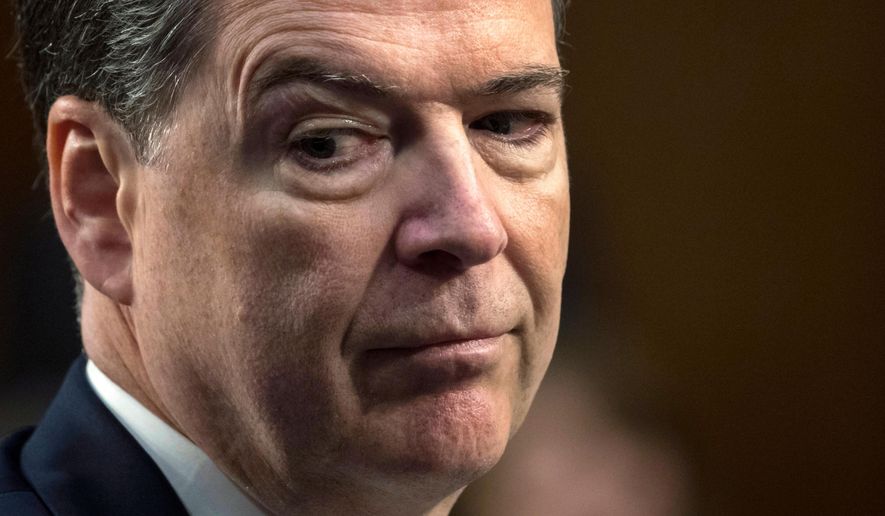Former FBI Director James Comey was being investigated by the government’s Office of Special Counsel for potential Hatch Act violations at the time he was fired, according to new documents released Friday as part of a Freedom of Information Act case.
The OSC investigation was cut short by the firing, since the office doesn’t probe people once they’re out of government.
Documents stemming from the investigation were released to Ty Clevenger, a lawyer who runs the Transparency Project and who is also pursuing bar sanctions against Mr. Comey, as well as former FBI Deputy Director Andrew McCabe.
The documents show dozens of complaints filed against Mr. Comey with the OSC saying he interfered with the 2016 election by the way he handled the investigation into Democratic presidential candidate Hillary Clinton’s secret emails.
Mr. Comey’s letter to Congress late in October 2016 announcing the FBI was looking at new emails on former Rep. Anthony Weiner’s laptop — Mr. Weiner was married to Mrs. Clinton’s top personal aide, and was being probed for sexting with underage girls — was out of bounds, many of the complaints said.
The OSC clearly took the matter seriously, opening an investigation. But it’s unclear how far investigators got before Mr. Comey’s May 9 firing.
In a letter dated May 17 Erica S. Hamrick, deputy chief of OSC’s Hatch Act Unit, told Mr. Comey they were shutting things down.
“As you know, the U.S. Office of Special Counsel (OSC) has been investigating allegations that you violated the Hatch Act when you made public statements and other communications about the Federal Bureau of Investigation’s (FBI) investigation into former Secretary Hillary Clinton’s use of a personal email server,” Ms. Hamrick wrote.
“However, you are no longer employed as Director of the FBI,” she continued. “Accordingly, in accordance with OSC’s policy not to continue investigations once an employee leaves federal service, OSC will close its file in this matter without further action.”
Ms. Hamrick also sent notices to dozens of people who had complained about Mr. Comey, telling them the probe was over. The names of the complainants are redacted from the filings.
The complaints are a reminder of just how fiercely many on the political left opposed Mr. Comey in 2016. Those views of Mr. Comey have flipped now, as he’s touring the country promoting a new book and criticizing President Trump.
The existence of the OSC investigation could be seen to bolster the Trump administration’s argument that Mr. Comey’s behavior during the 2016 election was aberrant. That’s the reason Mr. Trump gave when he fired Mr. Comey.
Mr. Trump’s opponents, though, say the firing was an attempt to derail an FBI investigation into Russian interference in the election.
Mr. Clevenger, who obtained the documents, said it’s now clear Mr. Comey was a partisan — but said he was surprised the notification to Congress in October 2016 would spark an OSC probe.
“It’s too bad the OSC didn’t have Comey’s book and his memos before he was fired, because he has made the case — better than anyone else — that he was playing politics at the FBI, Mr. Clevenger said.
“Even so, I’m a little surprised that OSC would open an investigation based on a letter that he sent to Congress. That letter certainly had political consequences, but I don’t see how you could construe it as political activity,” he said.
The Hatch Act is the government’s prohibition on federal employees engaging in politics.
In the complaints, those asking for an investigation cited Mr. Comey’s decision-making in the Clinton investigation, compared to his handling of the nascent probe into Russian activities during the election.
Several complaints noted that Mr. Comey informed Congress of the renewed email probe on Oct. 28 but didn’t yet have a warrant to search Weiner’s laptop.
“By your actions you used the authority of your office, an office which is supposed to be politically impartial, to have a direct impact on the election, favoring one candidate over another, which is a clear violation of the Hatch Act,” wrote one complainant. “You have damaged the democracy you were hired to protect.”
• Stephen Dinan can be reached at sdinan@washingtontimes.com.




Please read our comment policy before commenting.